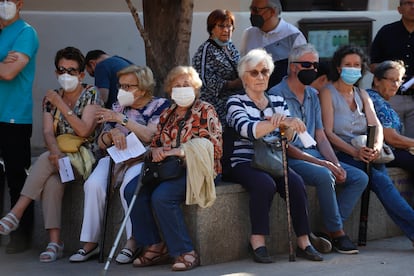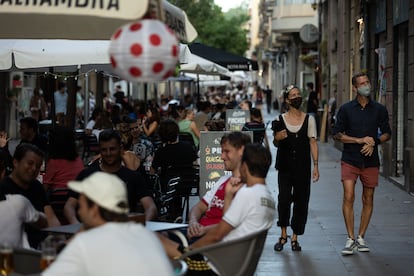Covid-19 surge in Spain revives debate on return of mandatory outdoor masking
Parliament is poised to vote on the government’s recent decision to relax the obligation in low-risk situations, at a time when some regional officials want to go back to tougher rules


Barely a month has gone by since Spain relaxed the rules about the use of masks outdoors, and some regions are already requesting that the restrictions be toughened once more. As the fifth wave of the coronavirus progresses, with the 14-day cumulative number of coronavirus cases per 100,000 inhabitants now at 622, some regional governments are either demanding or recommending that citizens use the face coverings at all times in order to reduce the risk of catching the virus.
Spain’s lower house of parliament, the Congress of Deputies, is due to debate on Wednesday whether or not to ratify the Cabinet decree that allows for masks to be removed when outside, provided that social distancing of 1.5 meters can be observed. While there are parties that disagree with the measure, Prime Minister Pedro Sánchez of the Socialist Party (PSOE) – whose coalition government with Unidas Podemos lacks a working majority – is likely to find the support that he needs.
The regional premier of the Basque Country, Iñigo Urkullu, is among those to have called on Sánchez to change the rules back to how they were. The Balearic Islands, meanwhile, have approved recommending masks outdoors whenever citizens come into contact with people from outside their household. Experts consulted by EL PAÍS have expressed support for the measure on the basis that it could serve to alert the population that the pandemic is not over, and that they should not drop their guard.
From a scientific point of view, I don’t see the necessity. It appears that the curve is flattening, so cases will start to fall, whether [masks] are made obligatory at all times or notToni Trilla, Hospital Clínic in Barcelona
It was June 26 when the rules changed and Spaniards could see each other’s faces once more. The scientific evidence had shown that transmission in outdoor contexts is very low, but experts continue to be divided on the convenience of keeping the restriction in place while Covid-19 vaccine coverage continues to be low. “We are approaching normality each day,” said PM Sánchez when the new rules were announced. “We want the economy to recover and for this recovery to be fair and long-lasting.”
At that time, the incidence was as low as 95 cases per 100,000 inhabitants, and the country was optimistically moving toward the summer, despite the fact that the curve of infections was beginning to creep back up again – coronavirus outbreaks during student trips were the first incidents that raised the alarm.
“The decision was taken too soon and it was mistaken,” stated Elías Bendodo, the spokesperson for the Andalusian government, speaking on Tuesday. The southern region has continued to recommend that its citizens wear masks at all times, and on Tuesday Bendodo lent his voice to Urkullu’s request for masks to be used in all circumstances. Andalusia has also filed a request with its regional High Court for permission to reinstate a nighttime curfew in a bid to curb the spread of the virus.
Catalonia, which currently has the highest incidence in Spain with 1,240 cases per 100,000 inhabitants over 14 days, has already implemented a nighttime curfew in over 100 municipalities, and has closed its nightclubs and bars unless they are outdoors. The government in the northeastern region is also in favor of masks being made obligatory once more in all contexts. But in Valencia, regional premier Ximo Puig has ruled out such a change, although he did recommend the use of masks “if you have any doubt” that there could be crowds.

The health minister, Carolina Darias, stated on Tuesday that the government has taken “tremendously prudent and gradual steps.” She continued: “Masks continue to be obligatory and only in very specific situations are they not: that is, when outside and a social distance of 1.5 meters can be maintained. We have seen images that we don’t like,” she continued, in reference to crowds of people without masks. “But it is not a question of the rule, but rather of non-compliance with the rule.”
Experts consulted also point out that the relaxation of mask rules is not to blame for this explosive fifth wave. According to Toni Trilla, chief of Epidemiology and Preventive Medicine at Hospital Clínic in Barcelona, “the damage was already done” when the rules were changed. Transmission had already spiked, but the new cases were yet to be detected. “Infections come from when people were together, in crowds, with no masks. Did the rules ever allow for masks to be removed in that context? No. If everyone was doing things properly, we would be much better off,” he adds.
Óscar Zurriaga, spokesperson for the Spanish Epidemiology Society, agrees. “The use of masks outside when there are no crowds is of no great use – not now, nor a year ago,” he argues. “Reintroducing them would bring us back where we were, but it is true that it is a symbolic element and it sends a message.” The epidemiologist argues that while the relaxation of mask rules a few weeks ago sent a message of “optimism and false security that the pandemic was over,” a U-turn that makes them obligatory once more would serve as a warning to people not to drop their guard. “The impact would be minor because many people are still using them, but the advantage could be greater compared to additional measures,” Zurriaga concludes.
Trilla believes that reimposing masks in all outdoor settings “could work as an example,” but he warns that “from a scientific point of view, I don’t see the necessity. It appears that the curve is flattening, so cases will start to fall, whether [masks] are made obligatory at all times or not. Is it a necessary measure? No. But if it is implemented, it will help rather than cause damage.”
A step back on masks, however, could have a negative effect on the population. “We would be back in a world where the government is not respected by citizens because it is zigzagging,” argues Rafael M. Ortí Lucas, president of the Spanish Society for Preventive Medicine, Public Health and Hygiene. The epidemiologist believes that the government acted too early when it changed the rules on masks, because it sent the message that “this was over.” But right now, he continues, “the use of masks could be maintained as it is if there were more health education.” If they were to be made obligatory once more, “the psychological effect of the measure” at a time when the epidemiological curve has been rising could also help to curb transmission, he argues.
Zurriaga, meanwhile, fears that the U-turns with these measures will negatively affect compliance with the rules. “Citizens are hugely confused,” he says. “We ask them for one thing and then the opposite, and what’s more, we call on them to evaluate the risk in each situation. This is very uncomfortable.”
With reporting by Cristina Vázquez, Juan Navarro, Mikel Ormazabal and Javier Martín-Arroyo.
English version by Simon Hunter.
Tu suscripción se está usando en otro dispositivo
¿Quieres añadir otro usuario a tu suscripción?
Si continúas leyendo en este dispositivo, no se podrá leer en el otro.
FlechaTu suscripción se está usando en otro dispositivo y solo puedes acceder a EL PAÍS desde un dispositivo a la vez.
Si quieres compartir tu cuenta, cambia tu suscripción a la modalidad Premium, así podrás añadir otro usuario. Cada uno accederá con su propia cuenta de email, lo que os permitirá personalizar vuestra experiencia en EL PAÍS.
¿Tienes una suscripción de empresa? Accede aquí para contratar más cuentas.
En el caso de no saber quién está usando tu cuenta, te recomendamos cambiar tu contraseña aquí.
Si decides continuar compartiendo tu cuenta, este mensaje se mostrará en tu dispositivo y en el de la otra persona que está usando tu cuenta de forma indefinida, afectando a tu experiencia de lectura. Puedes consultar aquí los términos y condiciones de la suscripción digital.








































